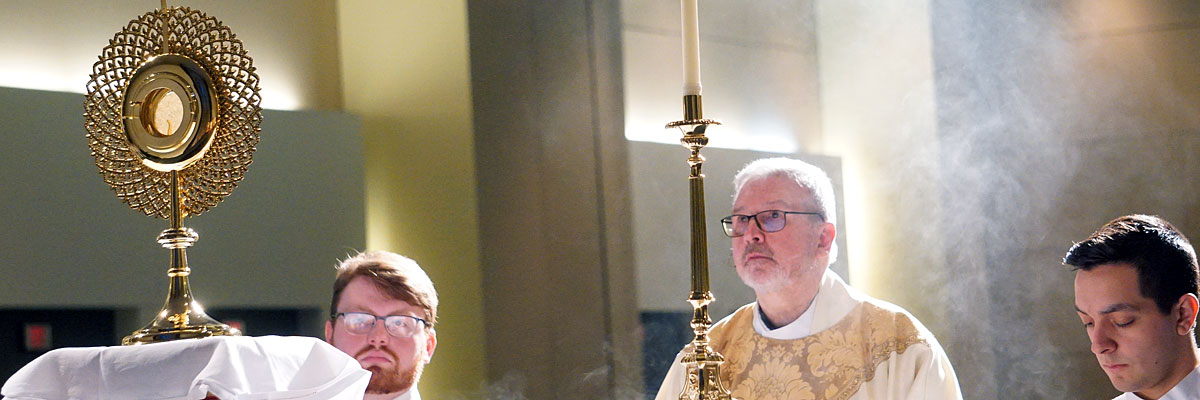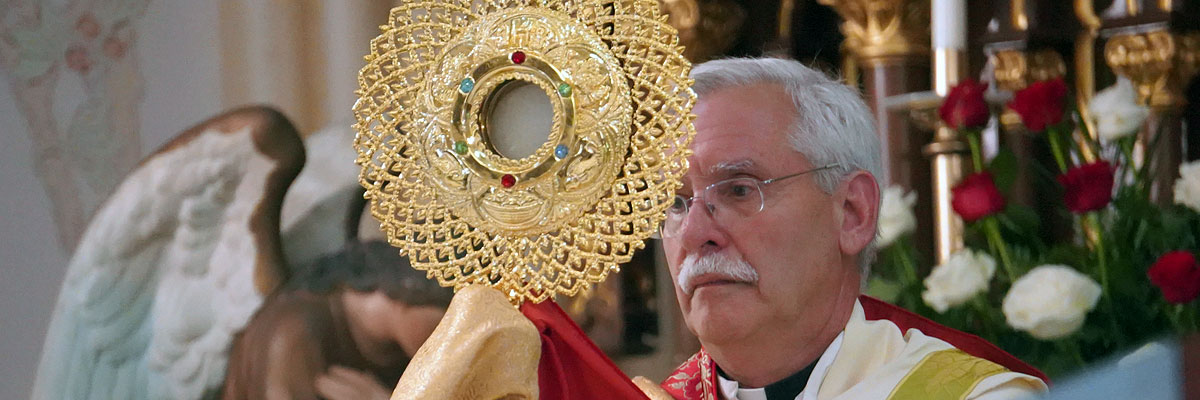Official Website of the
Catholic Diocese of Little Rock
Solemnity of the Most Holy Body and Blood of Christ 2015
Published: June 7, 2015
Bishop Anthony B. Taylor preached the following homily during confirmation Masses at St. Agnes Church in Mena on Saturday, June 6, 2015 and St. Joseph Church in Pine Bluff on Sunday, June 7, 2015.

Bishop Taylor
My blood type is AB+, which when written looks like my initials. It's an uncommon blood type found in only three percent of the population and makes me a universal donor for plasma. AB+ plasma is much in demand because it can be given to anyone, regardless of their blood type.
So for many years, I donated monthly until the blood institute disqualified me from donation because I have travelled to too many foreign countries. Plasma is harder to donate than whole blood. They hook the donor up to a machine, which draws and centrifuges the blood, separating out the plasma which is collected in a small bag.
The machine then mixes the red blood cells with saline solution and pumps them back into the donor's arm. This process is repeated three or four times until a full unit of plasma is collected. As you can imagine, giving plasma does involve a little bit of sacrifice:
And this one-time bloody sacrifice of his Body on Calvary is repeated every time we celebrate the Eucharist, the unbloody sacrifice of his Body and Blood on our altar and received by us in Communion.
1.) The phlebotomist has to use a very large needle to handle all these operations, and because it's so big, it always hurts a little when they stick you; 2.) It takes a lot of time to give plasma, over an hour hooked up to the machine — and woe to you if you need to go to the bathroom; and 3.) Your only payment is the good feeling you get for having helped others.
If they pay you for your plasma, they can't use it for transfusion; they use that for commercial products. Even though it is inconvenient and uncomfortable, plasma donation is a gift of life to all those burn victims whose survival depends on donor plasma. Plasma is a gift of body and blood so that others can live.
Today we celebrate the feast of Corpus Christi, the Body and Blood of Jesus. Jesus has the rarest blood type of all: It's not only 100 percent human blood like ours, it's also 100 percent divine because he is God. Since it's human blood, it's compatible with our own: We can receive it. And since it's divine blood, it's eternal: Those who receive it will never die.
Jesus is the only and universal donor of this divine/human blood, which he first gave at the Last Supper and first shed on Calvary and which he continues to give — donate to us — every time we celebrate Mass. And this — his gift of body and blood so that we can live — required of him far more sacrifice than you or I could ever fully imagine:
1.) He wasn't just stuck with a needle, torturers drove huge nails into him. 2.) He didn't spend an hour on a donor couch munching on cookies and reading magazines, he spent three hours tormented on a cross with only vinegar to drink. 3.) But on the other hand, his payment was far more than just good feelings for having helped others: He conquered sin and death for all, forever!
And this one-time bloody sacrifice of his Body on Calvary is repeated every time we celebrate the Eucharist, the unbloody sacrifice of his Body and Blood on our altar and received by us in Communion. Jesus gives us his Body and Blood as his gift of eternal life to us whose eternal survival depends him. The Eucharist is Jesus' gift of body and blood so that we can live.
In all of our churches, the central focal point is the altar where the Eucharist is consecrated and a tabernacle, where the Eucharist is reserved. The reason is that, for us Catholics, Jesus is the center of both public worship and private prayer. In many of our parishes we have perpetual adoration of the Blessed Sacrament 24 hours a day, seven days a week, in which I participate, and recommend very highly.
God gives you 168 hours every week and you are awake for more than 100 of those hours: One hour spent with the Lord each week is less than one percent of your waking hours. Can't you at least wait up one hour with him, who poured himself out so completely for you? Many people say this is their only hour of true peace and quiet the entire week.
Jesus gave us his Body and Blood so that by our having his divine, eternal blood within us, we will live forever like he does. And one reason for spending time in eucharistic adoration is to continually remind ourselves that our eternal survival depends on his divine help.







